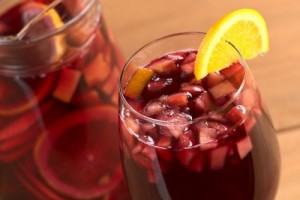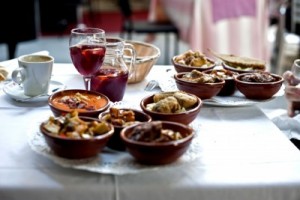 Somewhere near the very beginning of every wine class, an eager student asks about Sangria. They seem to think it is a type of wine, most likely because they have seen bottles of it alongside the wine selection at their local supermarket.
Somewhere near the very beginning of every wine class, an eager student asks about Sangria. They seem to think it is a type of wine, most likely because they have seen bottles of it alongside the wine selection at their local supermarket.
Now, before I go any further, let me assure you: I love Sangria. I’ve served many a punch bowl of it, and often order it a restaurant where the wine-by-the-glass selection looks otherwise questionable.
However, I want to get the point across to my students and fast…Sangria is not a type of wine, despite the bottles you see at the grocery store. While we’re at it, I remind them that a Mimosa is not wine and a Kalimotxo is not wine. What all three are, however, are popular cocktails, and in the case of Sangria, a type of punch made out of wine. The tradition of making punch from wine, such as Claret punch in Bordeaux and Gluhwein in Germany, is widespread.
Sangria actually has an interesting history, as should be expected for a drink whose name is based on “Sangre,” the Spanish word for “blood.” If we go back to 200 BC, we arrive at the days when the Romans were conquering the Iberian Peninsula. The Romans, of course, brought their tradition of wine and viticulture everywhere they went, and planted some of the first vineyards in Spain.
The locals, looking for refreshment, made fruit-infused, watered-down drinks from the hefty red wines of the region. We know that the tradition of wine consumption at the time was to dilute wine with water, so this makes sense. One theory states that the drink was simply called “sangria” after the color of blood.
Another theory on the name Sangria is based on the “four humors,” or bodily fluids (blood and three others too gross to mention). In the days of Ancient Rome, it was thought that varying levels of the four humors were present in a person based on their diet and activity. Personality characteristics and temperament were also based on humors. A person who aligned with the blood humor was said to be sanguine and considered to be courageous, hopeful and amorous. It doesn’t take much imagination to see how these traits can also be the result of daily dose of wine punch!
 At the 1964 World’s Fair, held in New York, the Spanish “world area” served its traditional fruity red wine punch to the crowds, and the people loved it! Sangria became popular in the United States, and started its inevitable march towards American commercialization and bottles of Arbor Mist Zinfandel “Sangria” in the ensuing years.
At the 1964 World’s Fair, held in New York, the Spanish “world area” served its traditional fruity red wine punch to the crowds, and the people loved it! Sangria became popular in the United States, and started its inevitable march towards American commercialization and bottles of Arbor Mist Zinfandel “Sangria” in the ensuing years.
In case you are now dying to try a glass of refreshing Sangria, or think it would be a hit at your next Tapas or Paella party, here’s my recipe. From what my fuzzy memory can recall, this recipe grew out of a version that I copied down from a library copy of Time Life’s “Food of the World – Spain” book back in the 1980’s. I’ve revised it constantly over the years so that it doesn’t much resemble that original, but I would love to see the original, if anyone still has a copy of those books!
Sanguine Sangria:
- 1 Bottle Red Rioja Crianza Wine (sure, you can substitute any red wine, or even white wine, but we are trying to keep it real here)
- ½ Cup Spanish Brandy (again with the keeping it real)
- ½ cup sugar
- 1 orange, seeded and cut into thin rounds
- 2 lemons, seeded and cut into thin rounds
- 1 red apple, cored and cut into thin slices
- 1 bottle (750 ml) sparkling water
Method:
- Place the prepared fruit, sugar, and brandy in the bottom of a large pitcher or other container. Stir around a bit until well mixed, and place in the refrigerator for at least one hour. If you need to prepare ahead, you can do this step the night before, and leave it in the refrigerator overnight.
- When ready to serve, add the wine and stir well. Add the sparkling water and give another stir.
- Serve over ice in a tumbler or wine glass. Make sure everyone gets a few pieces of fruit.
Be careful with this…its goes down easily and is thirst-quenchingly refreshing. However…it packs a punch. You’d best know what you are doing.
Post authored by Jane A. Nickles, your SWE Blog Administrator…bevspecialist@societyofwineeducators.org